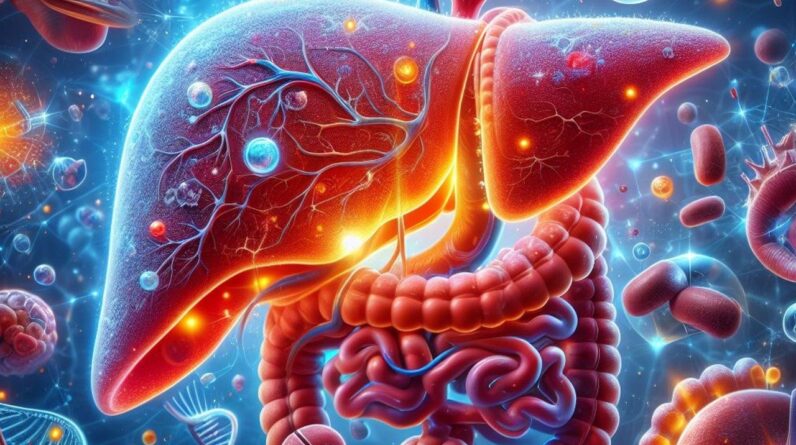
The Importance of Liver Health
As we focus on health and fitness, it’s essential to prioritize the health of our liver. Our liver plays a crucial role in various bodily functions, including detoxification, metabolism, and nutrient storage. Understanding the importance of liver health can help us make informed choices when it comes to our diet and lifestyle.
Functions of the Liver
Our liver is responsible for several key functions that are vital to our overall health and well-being. These functions include:
- Detoxification: The liver helps remove toxins and harmful substances from the body.
- Metabolism: It processes nutrients such as carbohydrates, fats, and proteins.
- Storage: The liver stores essential vitamins, minerals, and glycogen.
- Production: It produces bile, which aids in digestion, and blood-clotting proteins.
Understanding these functions can help us appreciate the role our liver plays in maintaining optimal health.
Common Liver Conditions
Several liver conditions can impact our overall health and well-being. Some common liver conditions include:
- Fatty Liver Disease: This condition occurs when there is an excessive accumulation of fat in the liver cells.
- Hepatitis: Hepatitis is inflammation of the liver, often caused by viral infections or excessive alcohol consumption.
- Cirrhosis: Cirrhosis is late-stage scarring of the liver caused by various liver diseases and conditions.
Being aware of these common liver conditions is crucial in taking preventive measures to maintain a healthy liver.

This image is property of pixabay.com.
Nutrition for Liver Health
Proper nutrition plays a significant role in supporting liver health and function. Incorporating specific nutrients into our diet can help support liver detoxification, reduce inflammation, and promote overall liver health. Here are some key nutrients that can benefit our liver:
| Nutrient | Food Sources |
|---|---|
| Antioxidants | Fruits (berries, citrus), vegetables (spinach, kale), nuts (walnuts), seeds (flaxseeds) |
| Fiber | Whole grains, fruits, vegetables (broccoli, Brussels sprouts), legumes (lentils, beans) |
| Healthy Fats | Avocado, fatty fish (salmon, mackerel), nuts (almonds, pistachios), seeds (chia, hemp) |
| Vitamin E | Almonds, sunflower seeds, hazelnuts, spinach, avocado |
| Vitamin C | Oranges, strawberries, bell peppers, kiwi, tomatoes |
| B Vitamins | Whole grains, leafy greens, meat, eggs, dairy products |
Incorporating a variety of these nutrients into our diet can help support liver health and overall well-being.
Hydration for Liver Health
Staying hydrated is essential for maintaining a healthy liver. Adequate hydration can help flush out toxins and waste products from the body, reducing the burden on the liver. Drinking an adequate amount of water throughout the day can support liver function and overall health.

This image is property of pixabay.com.
Limiting Alcohol Consumption
Excessive alcohol consumption can have a detrimental effect on liver health. Alcohol is toxic to the liver and, when consumed in large quantities, can lead to inflammation, fatty liver disease, and cirrhosis. Limiting alcohol consumption or avoiding it altogether can help protect our liver and prevent liver damage.
Importance of a Balanced Diet
Maintaining a balanced diet is crucial for supporting overall liver health. A diet rich in fruits, vegetables, whole grains, lean proteins, and healthy fats can provide our liver with the necessary nutrients to function optimally. Avoiding processed foods, sugary beverages, and excessive amounts of saturated and trans fats can help reduce the risk of liver-related conditions.

This image is property of pixabay.com.
The Role of Exercise
Regular physical activity plays a significant role in supporting liver health. Exercise can help improve metabolism, reduce inflammation, and promote weight loss, which can all benefit liver function. Incorporating a combination of cardiovascular exercise, strength training, and flexibility exercises into our routine can help support overall liver health.
Supplements for Liver Health
In addition to a balanced diet, certain supplements can support liver health and function. Some supplements that may benefit liver health include:
- Milk Thistle: Known for its antioxidant properties, milk thistle can help protect liver cells from damage.
- Turmeric: Curcumin, the active compound in turmeric, has anti-inflammatory and antioxidant effects, which can benefit liver health.
- Omega-3 Fatty Acids: Found in fatty fish and fish oil supplements, omega-3 fatty acids can help reduce liver fat and inflammation.
- Vitamin D: Adequate levels of vitamin D have been associated with improved liver function and reduced risk of liver disease.
Before incorporating any supplements into our routine, it’s essential to consult with a healthcare professional to ensure they are safe and appropriate for our individual needs.
Lifestyle Practices for Liver Health
In addition to nutrition and exercise, certain lifestyle practices can support liver health and function. Incorporating the following practices into our daily routine can help promote optimal liver health:
- Limiting Exposure to Toxins: Avoiding exposure to environmental toxins, chemicals, and pollutants can help reduce the burden on the liver.
- Managing Stress: Chronic stress can impact liver function, so implementing stress-reducing practices such as meditation, yoga, or deep breathing exercises can benefit liver health.
- Getting Adequate Sleep: Quality sleep is essential for overall health, including liver function. Aim for 7-9 hours of quality sleep each night to support optimal liver health.
By incorporating these lifestyle practices into our routine, we can support our liver and promote overall health and well-being.
Conclusion
Our liver plays a vital role in maintaining our overall health and well-being. By prioritizing nutrition, hydration, exercise, supplements, and lifestyle practices that support liver health, we can ensure that our liver functions optimally. Making informed choices about our diet and lifestyle can go a long way in supporting liver health and promoting a healthy lifestyle. Let’s prioritize our liver health to support our overall well-being.






